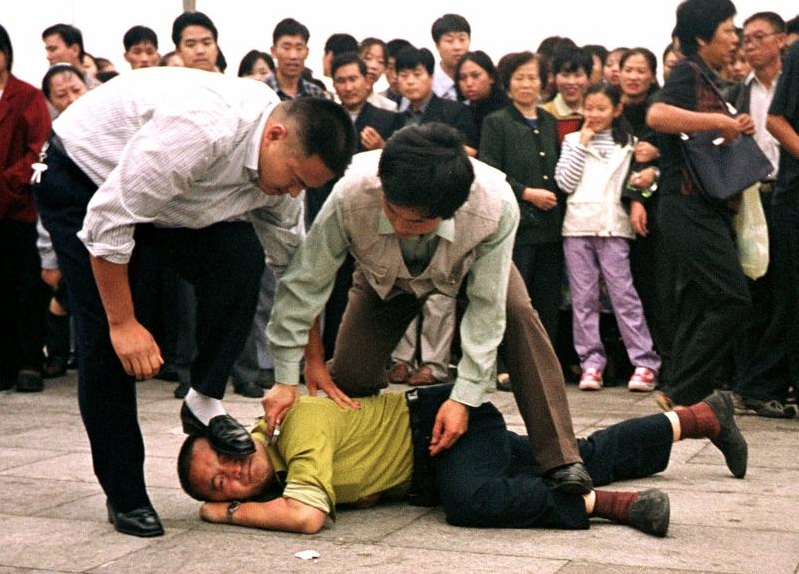
For North Koreans, local residents say contact with Christians in China is sufficient to warrant execution or consignment to a political prison camp upon repatriation.
In recent years, China has adopted a less benign stance with respect to Christian communities ministering to North Korean refugees, as well as acting as conduits for the spread of Christianity back into North Korea, states Marcus Noland, executive vice president and director of studies at Peterson Institute for International Economics. He also participates in the Committee for Human Rights in Korea.
Noland wrote a book, "Avoiding the Apocalypse: the Future of the Two Koreas," which won the Ohira Memorial Prize. He has two other books: "Witness to Transformation: Refugee Insights into North Korea" (co-authored with Stephan Haggard) and "Confronting the Curse: the Economics and Geopolitics of Natural Resource Governance" (co-authored with Cullen Hendrix).
North Korean authorities appear to regard the Christians as spies, no different from South Korean intelligence agents, stated Noland. "Indeed, North Korean operatives are suspected in the murder a prominent Korean-Chinese pastor, Han Choong-ryeol, who was killed in Jilin province this past April," he said.
Within the last week, a report entitled "Total Denial: Violations of Freedom of Religion or Belief in North Korea," was published by Christian Solidarity Worldwide. The report covers a wide range of topics including international law, North Korean law, actual practice, Chinese policies, and a remarkably fair-minded discussion of engagement by Christian groups, and the diverse attitudes, strategies, and tactics embodied by those groups.
Noland said the North Korean constitution guarantees religious freedom, up to a point: "Citizens have freedom of religion. This guarantees the right to build religious buildings or hold religious services. Religion shall not be allowed to attract foreign intervention or disrupt the state's social order."
He said the problem is that final clause within the constitution.
"The regime maintains what might be described as Potemkin Christian churches and Buddhist temples in a seeming effort to improve its international image, gain acceptance and even access aid," said the economist. "Yet even something as elementary as access to Christian or Buddhist texts is severely restricted, as I can personally attest."
But, Noland contends the deeper issue is the incompatibility of independent religious belief with the Ten Principles and 65 subclasses of the monolithic belief system codified in 1974, a doctrine that virtually deifies the Supreme Leader and demands total subjugation by the people. As a result, religious practitioners are subjected to severe repression, he said.
In the songbun caste system, religious adherence is justification for classification into the hostile class, shared Noland. "Once the 51 songbun sub-classifications were finalized in the late 1960s, individual religious groups were given their own specific category. Shamans were classified as category 29; Cheondoists (practitioners of a native Korean religion) as category 32; Protestants as category 37; Buddhists as category 38; and Catholics as category 39."
Christians are singled out for particularly severe abuse associated with their religion because it is considered anti-revolutionary and anti-nationalist due to its association with foreign imperialism, and the United States and South Korea, in particular.
Christians are routinely sent to the kwanliso or political prison camps, Noland said. "There they are subjected to torture including beatings, being hung on a cross over a fire, crushed under a steamroller, herded off bridges, trampled underfoot, and used as test subjects for medical training and experimentation."
Although no one knows the true number of [Christian] believers, Noland said North Korea has official estimates which appear motivated by the desire to persuade foreign interlocutors that freedom of religion exists and gain international acceptance.
According to the report, "Cornerstone Ministries International works with North Korean Christians in China and North Korea," in 2012, their representatives had contact with 37,000 churchgoers in North Korea, and they presumed between 10 to 45 percent of those imprisoned in detention camps are Christians.
Cornerstone Ministries therefore estimated a total number of 200,000 to 300,000 Christians, said Noland. "Obviously, this estimate is speculative. But whatever the base, the numbers may well be growing: The report provides evidence based on refugee testimonies suggesting an uptick in Christian (and Buddhist) practice over the past 15 to 20 years due to refugees returning from China exposed to these religious practices."







